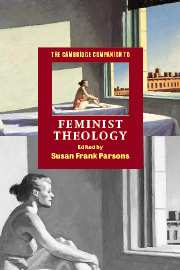Book contents
- Frontmatter
- Part one The shape of feminist theology
- 1 The emergence of Christian feminist theology
- 2 Feminist theology as intercultural discourse
- 3 Feminist theology as philosophy of religion
- 4 Feminist theology as theology of religions
- 5 Feminist theology as post-traditional thealogy
- 6 Feminist theology as biblical hermeneutics
- 7 Feminist theology as dogmatic theology
- Part two The themes of feminist theology
- Index
4 - Feminist theology as theology of religions
from Part one - The shape of feminist theology
Published online by Cambridge University Press: 28 May 2006
- Frontmatter
- Part one The shape of feminist theology
- 1 The emergence of Christian feminist theology
- 2 Feminist theology as intercultural discourse
- 3 Feminist theology as philosophy of religion
- 4 Feminist theology as theology of religions
- 5 Feminist theology as post-traditional thealogy
- 6 Feminist theology as biblical hermeneutics
- 7 Feminist theology as dogmatic theology
- Part two The themes of feminist theology
- Index
Summary
Not too long ago, I sat in a gathering of feminist theologians. The topic was 'diversity'; numerous complaints about lack of diversity were being voiced, but it was clear that lack of diversity among the Christians, not absence of religious diversity, was being protested. I pointed out that the diversity among Christians represented was far greater than the diversity among religions, and that the discussion presumed a Christian context which I, a non-Christian, found problematic. The conversation paused momentarily to allow me to make my comment, then returned to its previous direction, as if I had never spoken. I felt as if I had momentarily surfaced from underwater in some giant ocean, only to have the waters submerge me again immediately. I also noted that I had felt this way before. In earlier days, it had not been uncommon for men to treat women's observations about religious studies or theology in the same way. One of the few other non- Christian feminists locked eyes with me and whispered, 'They just don't get it, do they?' How many times had we said this about men when trying to explain to them what feminism is and why it matters? This was a profoundly discouraging moment for me, a non-Christian pioneer in the feminist study of religion who has spent my life and career as a feminist theologian and scholar of religions involved almost equally in feminist issues and in issues surrounding religious diversity.
- Type
- Chapter
- Information
- The Cambridge Companion to Feminist Theology , pp. 60 - 78Publisher: Cambridge University PressPrint publication year: 2002
- 2
- Cited by



